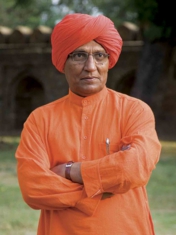 “For the world order to be one of peace and justice… it is imperative that a new and proactive spiritual vision commensurate to the challenges of the emerging world order be enunciated without delay.”
“For the world order to be one of peace and justice… it is imperative that a new and proactive spiritual vision commensurate to the challenges of the emerging world order be enunciated without delay.”
-SWAMI AGNIVESH
Swami Agnivesh is an Indian religious leader, politician and social activist, best known for his efforts to rid his country of modern forms of slavery and to improve the lives of working class members of society. He is a member of the International Peace Council and National Coordinator of the Spiritual Awakening Movement, and has served as chairperson of the United Nations Trust Fund on Contemporary forms of Slavery, the Bonded Labor Liberation Front, and as President of the World Council of Arya Samaj.
Swami Agnivesh was born in India in 1939. He holds degrees in both law and economics from St. Xavier’s College in Calcutta, and in 1963 began work as a lecturer of business management. Five years later, Agnivesh resigned from the University and traveled to Haryana, where he joined the Arya Samaj, a Hindu reformist movement. In 1970, he took on monastic duties and founded Arya Sabha, a political party based on the principles of Arya Samaj.
In the late 1970s and early 1980s, the Swami became a member of the Legislative Assembly of Haryana and served as State Minister of Education. During this time, he advanced the anti-caste movement in India and founded the Bonded Labor Liberation Front, a non-governmental organization headquartered in New Delhi dedicated to eradicating the vestiges of bonded labor, a form of slavery in which physical labor is demanded as repayment on a loan.
Although the Bonded Labor Liberation Front was founded five years after the official abolishment of bonded labor, the practice remained widespread and unremarked upon. Through Swami Agnivesh’s leadership, legislation abolishing child labor was passed and the application of human rights law has been extended in India. Over the years, his efforts have contributed to the release of more than 172,000 Indian workers, and he has helped create a number of trade unions to strengthen workers’ rights across his native India.
Swami Agnivesh has also been a vocal advocate of interreligious dialogue and cooperation, as well as women’s rights. In 1999, he led a multi-faith pilgrimage to the site of the murder of Christian missionary Graham Stewart Staines. Among those who followed him were many Hindu, Muslim, Christian, Sikh, Jain and Buddhist religious leaders. He also launched a highly successful campaign against female feticide – an extreme manifestation of violence against women, in which female fetuses are selectively aborted after pre-natal sex determination. His campaign set in motion legislation that was ultimately passed by the Indian government banning sex-determination tests.
Indian Prime Minister Dr. Manmohan Singh praised Swami Agnivesh’s accomplishments when, in 2004, he was presented with the Rajiv Gandhi National Sadbhavana Award. Of the Swami’s many accomplishments, Prime Minister Singh remarked, “He has been an eloquent champion of the poorer peoples’ rights in this age of rapid globalization… but above all it is in the fight against religious fundamentalism and the growth of communal hatred that Swami Agnivesh has made his greatest contribution.”
